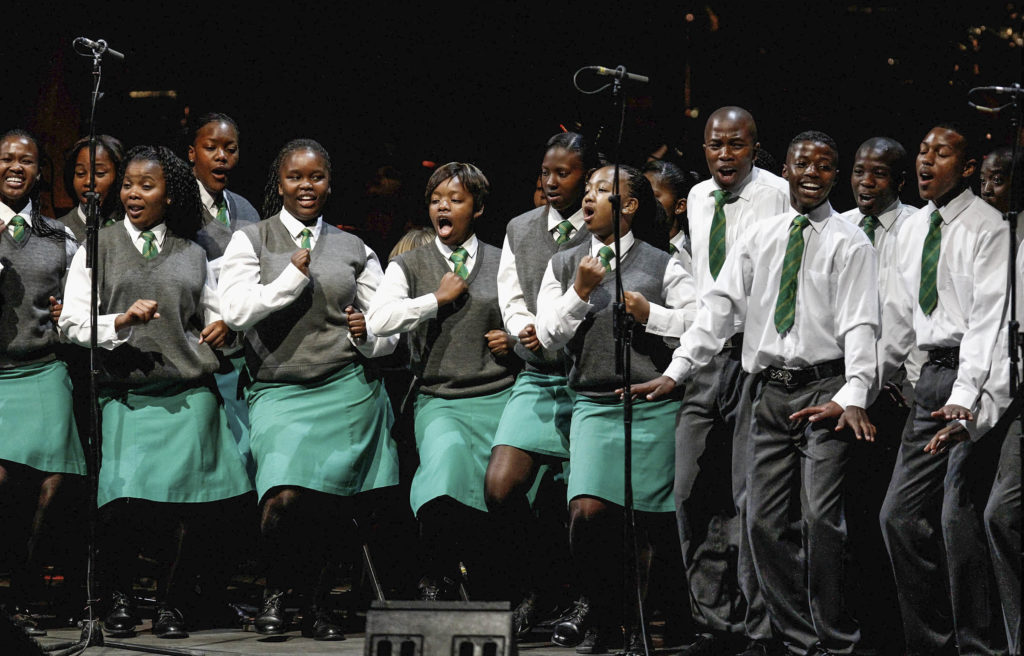Always in tune: Nolufefe Mtshabe translated the lyrics of the Magic Flute into isiXhosa. (Michelly Rall/Getty Images and Continuum Company)
Nolufefe Mtshabe was woman who knew how difficult it is to allow the magnificence of opera to come into the homes of ordinary South Africans. She was never afraid to laugh and play with her musical skills, which enabled her to lend wisdom to how words and music cleave together. Hers was the creative energy that gave urgency and wit to an African Magic Flute and an African Carmen; hers was the hand, ear and heart that recognised great talent in her students. Soprano, conductor, choir mistress, mother, teacher and friend, Mtshabe died suddenly on February 23, at the age of 55.
A choir is like a life force. Comprising many performers, if reined in with robustness and wisdom, it can be endowed with the thrust of a volcano or a rainstorm. With Mtshabe at its helm, her choir shone with tone and colour, depth and focus. Indeed, choirs were the stepping stones through the career of Mtshabe, who was fondly known as “Fefe” or “Miss”. She was also a deeply gifted teacher and the push behind South African-born opera stars Pretty Yende, Pauline Malefane, Pumeza Matshikiza and Monde Masimini, among others, that helped them to their brilliant careers.
When she was about eight years old, Mtshabe, who was born on November 27 1964 in the small town of Tsomo in the Eastern Cape, was fast-tracked by a teacher, one Mr Tukulu, into a choir comprising choristers who were already in high school. She graduated to Bianca Voices choir under the baton of Mandisa Nguza, a significant predecessor to most choirs in the district, and then Umtata Choral Society, under Lindelwa Nqatha, while she was studying education at Butterworth College.
It was in her first job, however — at Masiyile Senior Secondary School in Khayelitsha, Cape Town — that things began to happen for Mtshabe. She was taken on in a voluntary capacity and here she met Sheila Speelman, who introduced her to the robust competitiveness among South African choirs.
Deeply aware of the lack of exposure black South African choristers and audiences had to the operatic medium, Mtshabe became the driver for a choir at Masiyile, and as such, aimed to polish it into the best choir ever. And she did. When the school won an inaugural regional choir competition, the die was cast: Mtshabe’s job was cemented with a salary and the choir became Masiyile’s flagship.
In 1995, bass-baritone Simon Estes, the first African-American opera singer who agreed to grace South African shores after the demise of apartheid, was in Cape Town, performing in a production of Verdi’s Nabucco at the then Nico Malan Theatre (now the Artscape). Local music co-ordinator Charles Banjatwa brought Mtshabe’s young choir to Estes’s attention and something ignited.
Mtshabe — a person of immense empathy, commitment and belief —Mtshabe put 100% of her effort into the choir, but kept some energy over for her own vocal career. In 1997, she performed in Gabriel Fauré’s Requiem at St George’s Cathedral in Cape Town, and swept United States-born conductor Kamal Khan off his feet, beginning an important friendship for both of them.
 In between her many projects, Mtshabe found time to continue her own vocal career. Her death at age 55 has deeply affected her students and fans. (Michelly Rall/Getty Images and Continuum Company)
In between her many projects, Mtshabe found time to continue her own vocal career. Her death at age 55 has deeply affected her students and fans. (Michelly Rall/Getty Images and Continuum Company)
Khan met Mtshabe’s choir, and with the assistance of an exchange programme, invited the 40-strong group of choristers, comprising former pupils from Mayisile and other youngsters who were unemployed, to spend a year in the US, honing their understanding of the dynamics of voice. It was there that the performers had the opportunity to collaborate with Ray Charles, Stevie Wonder and Estes himself.
It was an exposure that set Mtshabe alight with enthusiasm and led her to enrol at the University of Cape Town’s South African College of Music, where she qualified with a performer’s diploma in voice, in 2001, and subsequently, a BMus honours, graduating in 2003.
In 2008, Mtshabe and Estes formed the Simon Estes Choral Group, which later changed its name to the Heavenly Voices Choir. Two years later, she performed in the South African opera Princess Magogo, composed by Mzilikazi Kumalo and arranged by Peter Klatzow. These years were incredibly rich for Mtshabe, giving her opportunities to exercise her creative muscles and test the boundaries of her talents.
 The Simon Estes Music School Choir perform on stage during the Celebrate Africa The Grand Finale at the Coca Cola Dome on July 9, 2010 in Johannesburg, South Africa. (Michelly Rall/Getty Images)
The Simon Estes Music School Choir perform on stage during the Celebrate Africa The Grand Finale at the Coca Cola Dome on July 9, 2010 in Johannesburg, South Africa. (Michelly Rall/Getty Images)
In the mid-2000s she worked for the Isango Portobello company (now known as Isango Ensemble), where she translated the lyrics of Mozart’s Magic Flute and Bizet’s Carmen, from German and French, respectively, into isiXhosa. Both performed works embodied the rare wisdom and fire that allowed them to surpass the confines of Africanness or Europeanness, and endowed them with a universality that shimmered.
Mtshabe leaves her two older sisters and their families; her twin son and daughter, Azizo and Azalo; hundreds of former students, whose dreams she gave the courage to be realised; and thousands of fans in her audiences.
Mtshabe will be buried on Saturday March 7 at Kwilali yaseGesini, KuMtshabe, in Tsomo, Eastern Cape